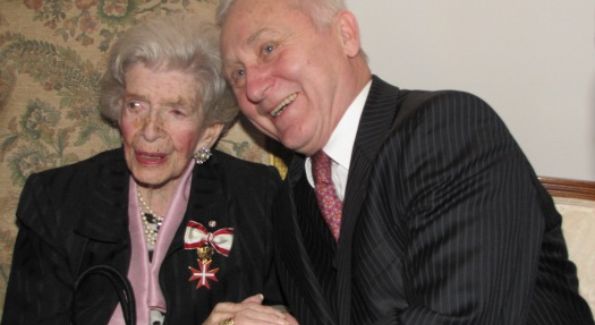Austria honors Gertrude d’Amecourt, Chile’s guitar-playing ambassador readies to rock, and a fitting tribute to a canine hero of Embassy Row
By Gail Scott
UNOFFICIAL AMBASSADOR: Only two blocks from her former Kalorama abode of four decades, Viennese-born Viscountess (Gertrude) d’Amecourt – well known for guiding Austrian ambassadors through Washington society over the years – was decorated by that nation’s current envoy, Christian Prosl, on behalf of Austrian President Heinz Fischer with the “Decoration of Honor in Gold for Services to the Republic.” Over 100 admirers of “Gertie’s,” including her three children (John, Nicole and Guy d’Amecourt) and bosom buddy Lolo Sarnoff, toasted the 100-year old grande dame at the Austrian Residence on January 13. The evening’s surprise came from another famous Austrian compatriot, Hollywood’s “Terminator,” i.e., former California Gov. Arnold Schwarzenegger. “You have been a true ambassador [of Austria],” he wrote, adding that “no one could have done it as well and achieved so much.” Prosl praised his guest of honor for his “charm and wit” before adding with a twinkle in his eye, “very sharp tongue – considered a good thing in Austria.” For once Gertie was speechless.
HOW AMBASSADORS RELAX: If you asked former Washington Ambassadors András Simonyi of Hungary and Pierre Vimont of France how they relax, their answers would both be: “Playing my guitar.” It seems that musical instrument is also the favorite of Chilean Ambassador Arturo Fermandois, 48, who abandoned his family’s “required” classical violin studies after seven years and switched to guitar at 16 because, “I didn’t have the talent to become a professional and the guitar was much easier and more fun.” By 18, he added an acoustical instrument and was playing American and British “protest songs,” especially those by his favorites Cat Stevens, John Denver, James Taylor and Jim Croce.
“My parents were crazy about classical music and all six of us were expected to regularly perform in the family’s chamber soirées” (his mother and sister followed his grandmother as professional pianists and teachers). In law school, he formed his first amateur ban in Santiago and, the second one, called Rockasaurios or Rockin’ Dinosaurs, when he turned 40.
As a first-time envoy last fall, his hands were full with the spectacular rescue of Chile’s 33 miners, other pressing diplomatic issues and settling in his own family of five but now he’s ready to start a band here as well. “Nothing can compare with the relaxation I feel after playing for two hours in front of a live audience,” he says, “It’s that unique connection with other people, a direct communication of feelings, happiness and sadness, that I miss.”
DIPLOMATIC DETECTIVE – OR, ONE DOG’S TALE: Yoriko Fujisaki, wife of the Japanese Amb. Ichiro Fujisaki, never meant to write a book but was “overwhelmed with sorrow” – what the Japanese call “pet loss”– when “Skipper,” their beloved black Labrador, died last March at age 14. She followed a friend’s advice and started writing about her former companion. Now those fond memories are an inspirational children’s book, entitled “Moudouken ni narenakatta, Skipper” or, “Let’s Go Home, Skipper,” published in Japanese by Bungeishunju-sha, one of her country’s top publishers.
The moral of the book (from which a portion of the royalties will be donated to the Humane Society in Japan and Washington) is Skipper’s true-life story.
During a previous posting here when their daughters were young, the Fujisakis offered a “temporary home” to a puppy named Skipper who was to become a guide dog for the blind.
After he failed his test at the age of nine months (his focus was too narrow and intense), he became a bomb-sniffing police dog and later spent more than a decade working in the Milan airport after being given by the U.S. to the Italian government. Upon his retirement, the Fujisakis welcomed him “home.
”
“Even when you fail in one test, there is always a way that leads you to a successful life if you find your potential,” the author explains. “Some say the book is also good for adult reading and raising children, emphasizing not what you want them to become but looking at what they do best.
”

